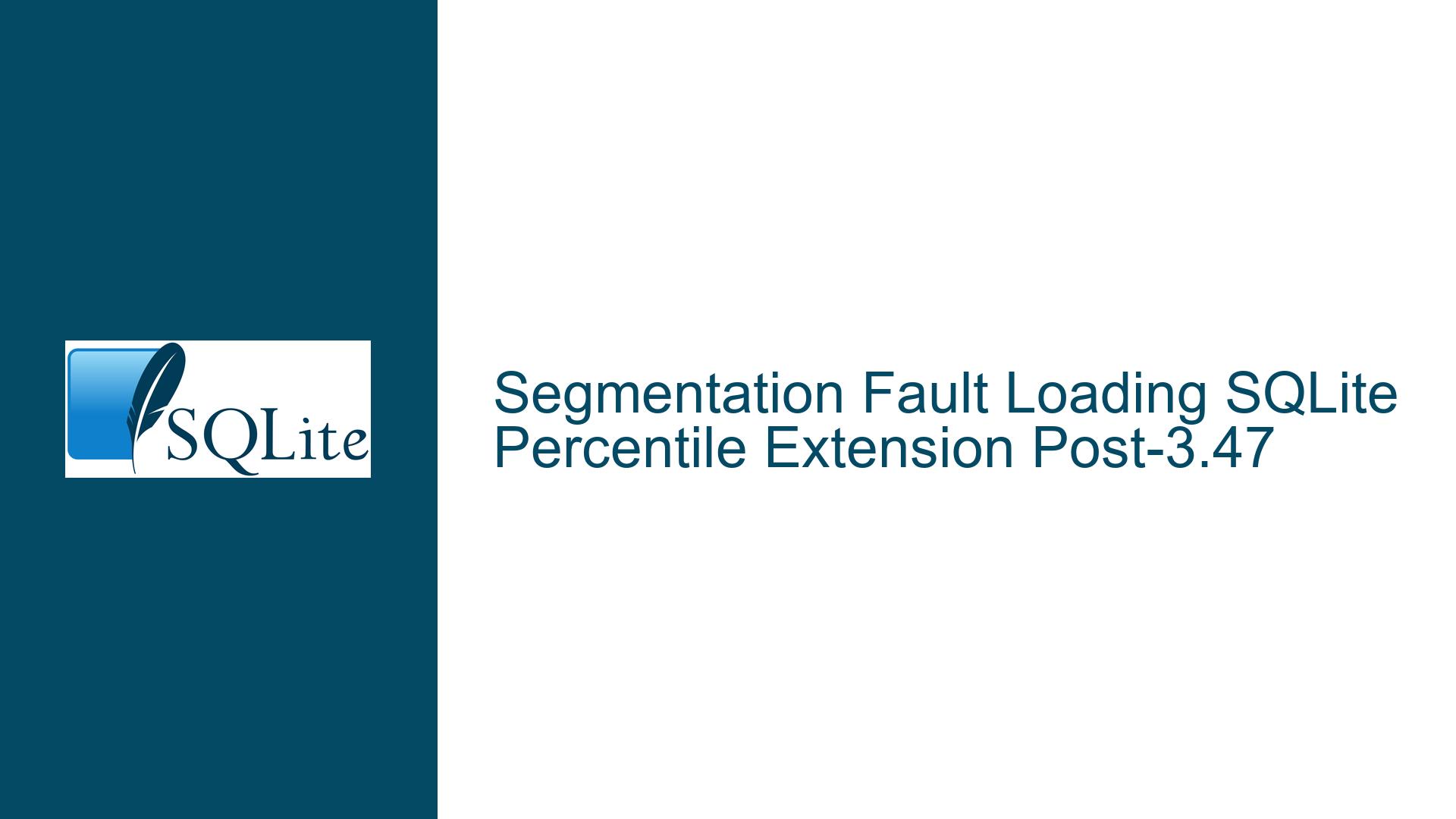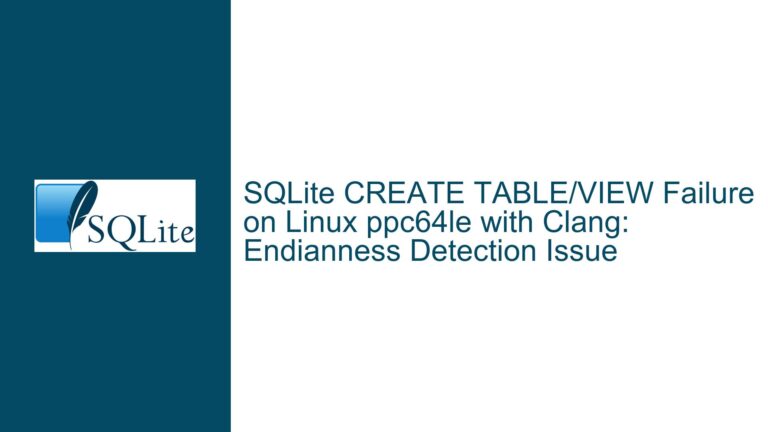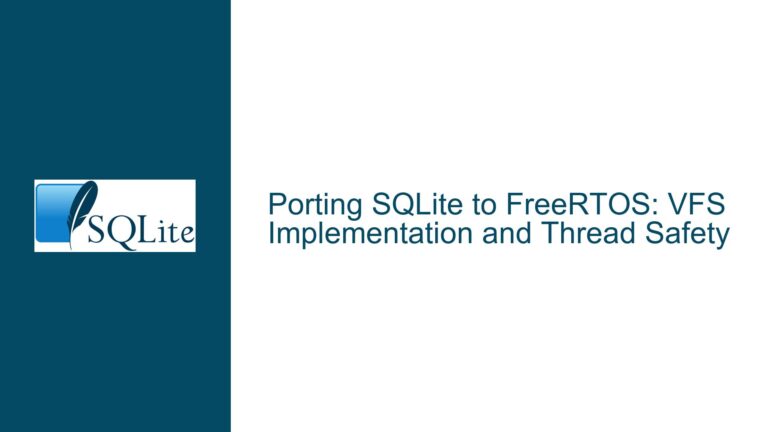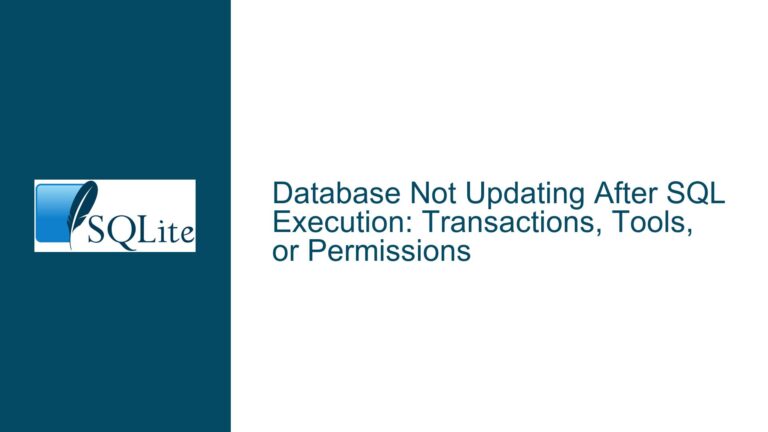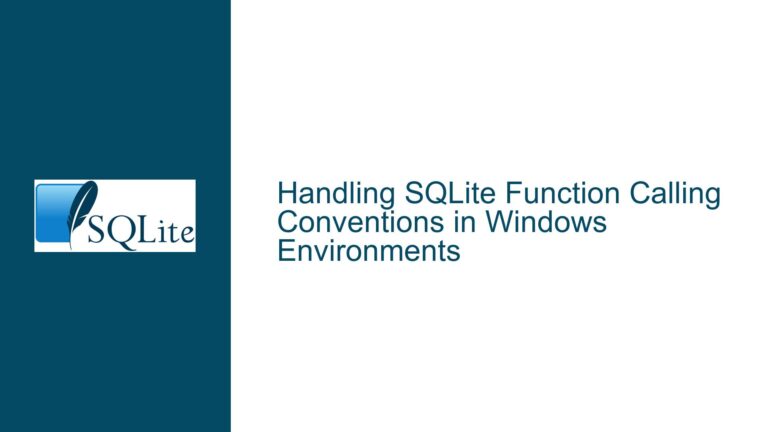Segmentation Fault Loading SQLite Percentile Extension Post-3.47
Issue Overview: Segmentation Fault When Loading Percentile Extension in SQLite 3.47+
The core issue revolves around a segmentation fault occurring when attempting to load the SQLite percentile extension (percentile.so) in versions of SQLite 3.47 and later. This issue manifests specifically when the extension is built as a shared object and loaded dynamically using the .load command in the SQLite shell. Notably, the same extension works without issues in SQLite 3.46 and earlier versions, and it also functions correctly when statically compiled into the SQLite shell binary.
The segmentation fault occurs during the initialization phase of the extension, where the extension attempts to interact with the SQLite API. The fault is tied to a conditional compilation block in the percentile.c source file, which fails to correctly distinguish between static and dynamic (extension) builds. This misalignment causes the extension to improperly initialize the SQLite API, leading to a segmentation fault.
The issue is further complicated by the fact that the sqlite3ext.h header file includes sqlite3.h, which defines the SQLITE3_H macro. This macro is always present, regardless of whether the extension is being built as a shared object or statically linked. As a result, the conditional compilation logic in percentile.c fails to correctly initialize the SQLite API for dynamic extensions, leading to the segmentation fault.
Possible Causes: Misaligned Conditional Compilation and API Initialization
The segmentation fault is rooted in the conditional compilation logic within the percentile.c source file. The relevant code snippet is as follows:
#if defined(SQLITE3_H) || defined(SQLITE_STATIC_PERCENTILE)
(void)pApi; /* Unused parameter */
#else
SQLITE_EXTENSION_INIT2(pApi);
#endif
This code is intended to handle two scenarios:
- Static Builds: When the percentile module is compiled directly into the SQLite shell binary, the
SQLITE_STATIC_PERCENTILEmacro is defined. In this case, thepApiparameter is unused, and the code simply casts it tovoidto suppress compiler warnings. - Dynamic Builds (Extensions): When the percentile module is built as a shared object (
.sofile), theSQLITE_EXTENSION_INIT2(pApi)macro is used to initialize the SQLite API.
The issue arises because sqlite3ext.h includes sqlite3.h, which defines the SQLITE3_H macro. This macro is always present, regardless of whether the extension is being built as a shared object or statically linked. As a result, the conditional compilation logic incorrectly assumes that the extension is being built statically, even when it is being built as a shared object. This leads to the SQLITE_EXTENSION_INIT2(pApi) macro being skipped, causing the extension to fail to initialize the SQLite API properly.
The segmentation fault occurs because the extension attempts to interact with the SQLite API without proper initialization. This results in undefined behavior, as the extension is effectively operating on uninitialized or invalid memory.
Troubleshooting Steps, Solutions & Fixes: Correcting Conditional Compilation and Ensuring Proper API Initialization
To resolve the segmentation fault, the conditional compilation logic in percentile.c must be corrected to ensure proper initialization of the SQLite API for dynamic extensions. The following steps outline the troubleshooting process and the solution:
Step 1: Identify the Conditional Compilation Issue
The first step is to recognize that the SQLITE3_H macro is always defined due to the inclusion of sqlite3.h in sqlite3ext.h. This means that the conditional compilation logic in percentile.c will always evaluate the first branch of the #if statement, regardless of whether the extension is being built as a shared object or statically linked.
Step 2: Modify the Conditional Compilation Logic
To fix the issue, the conditional compilation logic must be updated to correctly distinguish between static and dynamic builds. One approach is to remove the SQLITE3_H check and rely solely on the SQLITE_STATIC_PERCENTILE macro. The updated code should look like this:
#if defined(SQLITE_STATIC_PERCENTILE)
(void)pApi; /* Unused parameter */
#else
SQLITE_EXTENSION_INIT2(pApi);
#endif
This change ensures that the SQLITE_EXTENSION_INIT2(pApi) macro is used for dynamic builds, while the pApi parameter is ignored for static builds.
Step 3: Rebuild the Extension
After modifying the conditional compilation logic, rebuild the percentile extension using the following commands:
gcc -g -fPIC -shared percentile.c -o percentile.so
Step 4: Test the Extension
Load the rebuilt extension in the SQLite shell to verify that the segmentation fault has been resolved:
$ sqlite3
> .load /path/to/percentile.so
If the extension loads without errors, the issue has been resolved.
Step 5: Apply the Fix to the SQLite Source Code
If you are working with the SQLite source code, ensure that the fix is applied to the percentile.c file in the ext/misc directory. You can then rebuild the SQLite shell and extension as needed.
Step 6: Address Platform-Specific Issues
The discussion also mentions platform-specific issues, particularly on Windows. If you encounter similar issues on other platforms, ensure that the build environment and compiler flags are correctly configured. For example, on Windows, you may need to use the -DSQLITE_API=__declspec(dllexport) flag when building the extension.
Step 7: Monitor for Future Updates
The fix discussed in the forum thread was initially applied to the SQLite trunk but not included in the 3.47.1 release. If you are using a version of SQLite that does not include the fix, you can manually apply the patch or build SQLite from the branch-3.47 source code, which includes the corrected percentile.c file.
By following these steps, you can resolve the segmentation fault issue when loading the percentile extension in SQLite 3.47 and later versions. The key is to ensure that the conditional compilation logic correctly distinguishes between static and dynamic builds, allowing the extension to properly initialize the SQLite API. This fix not only addresses the immediate issue but also provides a framework for troubleshooting similar problems in other SQLite extensions.
